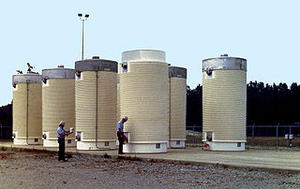Nuclear waste storageScience group: storing spent nuclear fuel in dry casks significantly safer then wet pools storage
An NRC report on the lessons of the Fukushima disaster says that storing spent nuclear fuel in wet pools is “adequate” to protect the public; a science groups says there is a significantly safer way to store the 55,000 tons of radioactive waste currently stored by the 104 nuclear power plants operating in the United States: transferring the spent fuel to dry casks

Spent nuclear fuel rod dry storage casks // Source: wikipedia.org
The Nuclear Regulatory Commission (NRC) on Friday issued a staff paper evaluating recommendations based on lessons learned from the Fukushima nuclear accident in Japan in March 2011.
The paper reiterated the NRC’s position that storing spent nuclear fuel in wet pools at commercial nuclear power plants provides “adequate” protection for public health and safety and the environment. The NRC also stated that it will continue to study spent fuel storage issues for up to five more years.
Edwin Lyman, senior scientist with the Union of Concerned Scientists’ (UCS) Global Security Program, disagrees. He says:
“‘Adequate’ is not good enough, especially when there is a safer alternative.
“Nuclear plant owners are currently storing some 55,000 tons of spent fuel — which remains dangerously radioactive for hundreds of thousands of years — in overcrowded cooling pools that require active safety measures to prevent overheating. These pools contain, on average, much more spent fuel and are more densely packed than the spent fuel pools at the Fukushima reactors. An accident or terrorist attack resulting in a rapid loss of cooling water from a pool could lead to a self-sustaining fire and release of a massive quantity of highly radioactive Cesium-137 into the environment.
“However, 80 percent of that stored spent fuel has been in the pools for more than five years and can be moved to dry casks, which do not require power for cooling and are passively safe. Given the potential consequences from a severe accident or terrorist attack on a spent fuel pool, it makes sense to transfer to casks as soon as it is safe to do so.
“While NRC studies find that spent fuel pool storage provides ‘adequate protection,’ the uncertainties in those studies are large enough that it is prudent to move the fuel to dry casks, which are safer. For example, just today the NRC and the Nuclear Energy Institute discussed the need for further work to evaluate the seismic vulnerability of spent fuel pools. While the NRC encourages new reactor designs to have passive safety features, it appears unwilling to take steps to increase passive safety measures, like dry casks, for existing reactors.”
